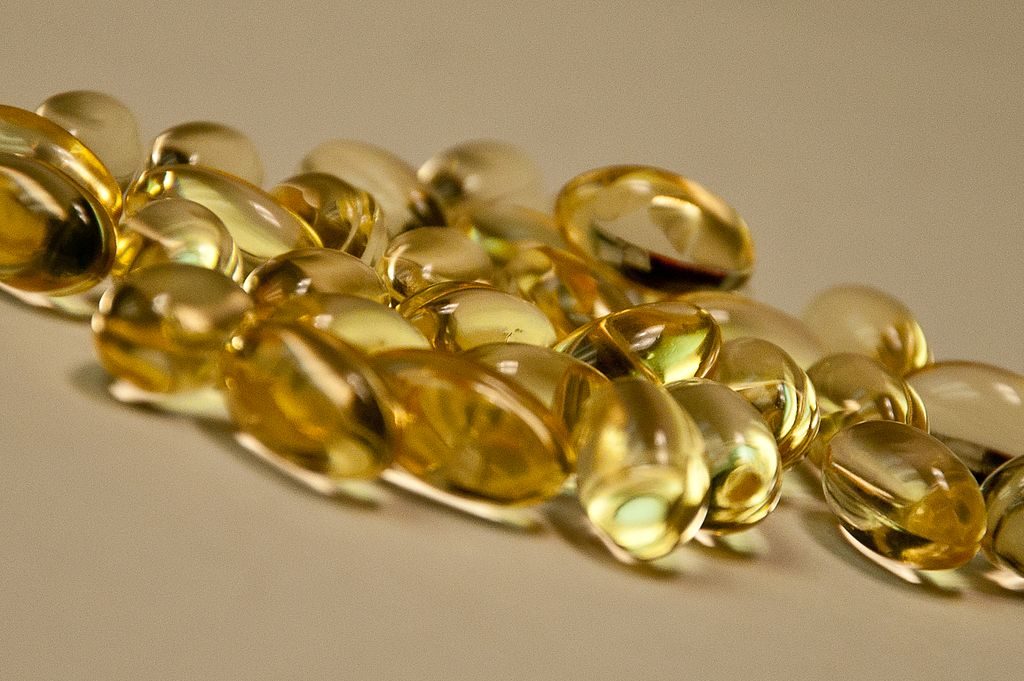Antioxidant vitamin E may reduce risk of cataracts and slow down macular degeneration, but high doses should be avoided.

- Delaying AMD. Vitamin E in combination with other antioxidants, carotenoids, and zinc may slow the progression of AMD.
- Protecting against cataracts. Higher dietary intake of vitamin E may lower the risk of cataracts.
Overview
Vitamin E refers to a group of 8 fat-soluble compounds known as tocopherols and tocotrienols. Its main function is to act as an antioxidant that helps protect cells from damage caused by free radicals, as well as helping support the immune system.
Similar to other popular antioxidants such as vitamin C, vitamin E is frequently used a dietary supplement purported to support overall health. It is typically sold in the form of α-tocopherol, either by itself or in multivitamins and other multi-ingredient products.
In addition, vitamin E’s antioxidant qualities are also believed to help protect the eyes from age-related macular degeneration (AMD) and cataracts – the two leading causes of vision deterioration and blindness. Despite this, medical research on the merits of vitamin E supplementation for vision has been mixed.

How Vitamin E Might Help With Vision
Antioxidant activity
Vitamin E’s major role in the body is to act as a fat-soluble antioxidant that helps protect cells from oxidative damage.2 Since oxidative stress plays a central role in some eye disorders – most notably age-related cataracts and macular degeneration – taking an antioxidant supplement may be able to help protect the eyes from these conditions.
However, it should be noted that in high doses, vitamin E has also been shown to act as a pro-oxidant, meaning that it can increase oxidative stress.3 For example, 400 IU of vitamin E taken daily for 4-6 years was shown to advance the progression of retinitis pigmentosa – a hereditary eye condition – rather than slow it down. 4
Vitamin E Uses & Benefits for Vision
As a vision supplement, vitamin E is usually taken as part of a multi-ingredient formula that includes antioxidants, carotenoids, and minerals. Research on the use of vitamin E for vision indicates that:
- Supplementing with vitamin E has no effect on preventing age-related macular degeneration, but may help slow down its progression when taken as part of the AREDS formula (vitamin E 400 IU, vitamin C, beta-carotene, zinc, and copper) 5
- Regularly supplementing with high doses (100+ mg) of vitamin E alone may have no effect or even increase the risk of age-related cataracts
- High dietary vitamin E intake may decrease cataract risk
If your goal is to support eye health, it seems best to take vitamin E as part of a multi-ingredient formula, and/or increase your intake of vitamin E-rich foods.

Research
Human Research
Research suggests that higher dietary vitamin E intake may decrease risks of cataracts, and supplementing vitamin E with some other antioxidants, carotenoids, and minerals may help slow down the progression of AMD. Taking high doses of vitamin E only, however, seems to have no effect or actually increases risk of cataracts.
This large double-blind, randomized clinical trial sponsored by the U.S. National Institutes of Health examined whether high doses of vitamin C, vitamin E, beta-carotene and zinc could slow the progression of AMD. A total of 3640 people were given one of four treatments: antioxidants (vitamin C, 500 mg; vitamin E, 400 IU; and beta carotene, 15 mg); zinc (80 mg zinc oxide 2 mg copper oxide); antioxidants plus zinc; or placebo. After an average of 6.3 years, all three treatments were found to reduce the odds of developing advanced AMD, with the combination treatment having the best results.
- The researchers concluded that “Those with extensive intermediate size drusen, at least 1 large druse, noncentral geographic atrophy in 1 or both eyes, or advanced AMD or vision loss due to AMD in 1 eye, and without contraindications such as smoking, should consider taking a supplement of antioxidants plus zinc.“6
High-dose vitamin E supplementation (~100 mg) may increase risk of age-related cataracts
This observational study explored the link between multivitamin and vitamin C & E supplement intake and age-related cataracts in men. A total of 31,120 Swedish men (age 45-79) were assessed for their supplement intake and followed up with after 8 years. It was discovered that men who regularly or occasionally took vitamin E supplements only (with average doses of 100 mg) had a 59% increased risk of age-related cataracts.
- The researchers concluded that “These results suggest that the use of high-dose (but not low-dose) single vitamin C or E supplements may increase the risk of age-related cataract.”7
This observational study compared dietary intake of fruits, vegetables, and vitamins C & E with occurrence of cataracts and cataract extraction. A total of 599 Spanish participants (aged 65+) were assessed for their dietary intakes and cataract occurrence. The study found that dietary intake of at least 8 mg of vitamin E daily was associated with a reduced occurrence of cataracts or cataract extraction.
- The researchers concluded that “High daily intakes of fruit and vegetables and vitamins C and E were associated with a significantly decreased of the prevalence of cataract or cataract surgery.”8
High dietary intake of vitamin E may reduce risk of cataracts in women
This observational study examined the relationship between intake of dietary antioxidants and the risk of cataracts in women. A total of 35,551 women were assessed for their dietary and supplement antioxidant intake, and were followed up with over a period of 10 years. Women with high intakes of vitamin E were found to have a 14% lower risk of developing cataracts.
- The researchers concluded that “...higher dietary intakes of lutein/zeaxanthin and vitamin E from food and supplements were associated with significantly decreased risks of cataract.”9
Vitamin E supplementation does not appear to reduce cataract risk in men
This study looked at the link between vitamin supplementation and cataracts. A total of 17,744 men were assessed about their vitamin and multivitamin supplementation and followed up with over a 60 month period. The study found that use of vitamin E and/or C supplements alone was not associated with a reduce risk of cataracts. Multivitamin supplementation, on the other hand, significantly reduced the risk.
- The researchers concluded that “…men who took multivitamin supplements tended to experience a decreased risk of cataract.”10
Dosage for Vision
- Research suggests that daily vitamin E intake of 8 mg or more reduces risk of cataracts; high supplemental doses (100+ mg) may actually increase risk of age-related cataracts
- Single-ingredient vitamin E supplements typically come in 200 – 1,000 IU doses
- Multi-ingredient products typically contain 30 – 60 IU vitamin E
Available Forms
- Alpha-tocopherol, also known as d-alpha-tocopherol – the natural, and most biologically-active form of vitamin E
- Dl-alpha-tocopherol, a synthetic form of vitamin E
- The AREDS formula contains vitamin E (400 IU) mixed with other antioxidants, carotenoids, and zinc. High-quality research backs the use of this formula to slow down the progression of AMD.
- Vitamin E is frequently added to multivitamins
Supplements in Review Says
- Vitamin E as part of AREDS formula or a multivitamin.
Vitamin E may help with cataracts and AMD. Research indicates that vitamin E taken as part of the AREDS formula may delay the progression of AMD, and that high dietary intake can lower the risk of developing cataracts.
High doses of vitamin E alone should be avoided. For delaying the progression of AMD the vitamin E-containing AREDS formula is the best option. Otherwise, look to increase dietary of vitamin E or take a multivitamin. Isolated vitamin E products should be avoided since prolonged consumption of high doses has been associated with increased cataract risk.
Leave a Reply